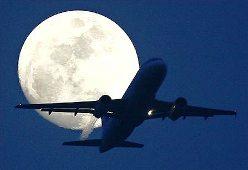 Global airlines' body IATA on Monday asked governments across the world not to single out aviation industry for taxes and regulations and to treat it as ‘any other business’.
Global airlines' body IATA on Monday asked governments across the world not to single out aviation industry for taxes and regulations and to treat it as ‘any other business’.
"One of our key messages to governments will be that aviation should be treated like any other business.
"We don't want a handout, but we also don't want to be singled out for special fees and taxes, and commercial regulations that chill market creativity and initiative," IATA Director General and CEO Tony Tyler said in Cape Town.
His statement came just ahead of the International Air Transport Association's three-day annual meeting and World Air Transport Summit which began in Cape Town on Monday.
IATA has a membership of over 240 airlines across the world, that amounts to little less than 90 per cent of global air traffic.
The conference, being attended by some 700 aviation leaders including chiefs of airlines and aircraft-makers, is discussing issues like aviation safety, environment, distribution and financial sustainability among others.
Among the attendees are Air India CMD Rohit Nandan and Jet Airways Chairman Naresh Goyal, who is also a member of the IATA Board of Governors.
Inaugurating the conference, Tyler said, "razor thin margins are characteristic for the airline industry.
“But achieving profits with the continued weakness in the global economy is a major achievement.
"And if you add the impact of oil prices at over $100/barrel (Brent), the achievement grows. Remember that fuel accounts for about a third of industry costs."
Referring to government policies towards aviation in Africa and elsewhere, he said the authorities tend to see aviation as ‘an elite product, rather than as a critical component of the continent’s economic infrastructure.
As a result, it is heavily taxed -- often in violation of International Civil Aviation Organization principles that prohibit the taxation of jet fuel for international operations.
"Moreover, despite high infrastructure charges, the failure to invest in fuel supply infrastructure has resulted in frequent supply disruptions that cripple the operations."
In issues which have strong relevance to Indian aviation as well, the IATA chief criticised ‘direct taxes on tickets’ in Africa, saying that taxes of various kinds including those on tourism, VAT, sales taxes and infrastructure levies ‘all
"This limits the power of aviation to drive economic growth, which would be a much greater source of revenue for governments," the IATA chief said.
The IATA upgraded its global outlook for the airline industry to a $12.7 billion profit in 2013 on $711 billion in revenues.
This was $2.1 billion better than the $10.6 billion profit projected in March this year.
Tyler said the global aviation industry was growing strongly on routes linked to emerging markets.
"We see strong growth among African (4.6 per cent), Asia-Pacific (4.7 per cent), Middle Eastern (10 per cent) and Latin American (2.8 per cent) airlines."
Growth was slower in Europe (2.2 per cent) due to the ongoing crisis in Eurozone economies and in North America (0.6 per cent) "where the market is mature, carriers are tightly managing capacity and there are still questions about the strength of the economic recovery," Tyler said.
Noting that the 100th anniversary of the first commercial airline flight would be celebrated on January one next year, Tyler said ‘it is altogether appropriate that we look forward to the next century of commercial air transport in a region which is so rich in promise.’
This is the first time the AGM is being held in South Africa and the third in IATA's 69-year history that it is taking place in Africa. It was held in Cairo in 1946 and in Nairobi in 1991, IATA officials said.
The AGM opened with keynote speeches from South Africa's Deputy President Kgalema Motlanthe and Minister for Public Enterprises Malusi Gigaba, who stressed on the critical role of aviation in the African continent.
Among those participating in panel discussions are chiefs of American and Delta Airlines, Thomas Horton and Richard Anderson respectively, Singapore Airlines CEO Choon Phong Goh, Emirates Airline President Tim Clark and Etihad Airways CEO James Hogan.
The debates would be held on topics ranging from infrastructure cost, ancillary revenues, achieving carbon neutral growth from 2020 and Crisis Communications and Social Media to 'Unlocking Africa's Potential' in aviation.










